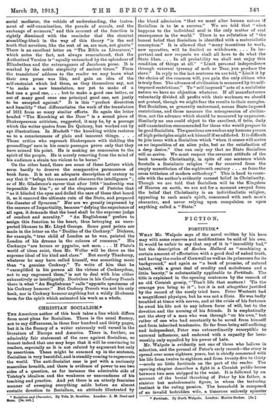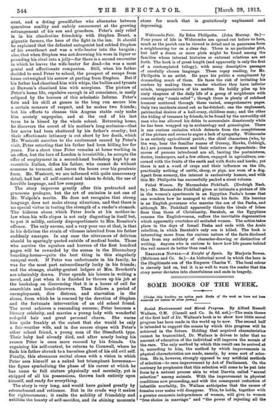FICTION.
FORTITUDE.*
WHAT Mr. Walpole says of the novel written by his hero may with some reserves and modifications be said of his own. It would be unfair to say that any of it is "incredibly bad," but the description of Reuben Ballard as "combining a certain amount of affectation with a good deal of naked truth, and having the rocks of Cornwall as well as its primroses for its background," and again as "a book of promise, of natural talent, with a great deal of crudity and melodrama and a little beauty," is substantially applicable to Fortitude. The title is explained in the opening sentences by the remark of an old Cornish gossip, "Tisn't life that matters ! 'Tis the courage you bring to it "; but it is not altogether justified by the record of the sorely tried hero. Peter Westcott had a magnificent physique, but he was not a Stoic. He was badly troubled at times with nerves, and at the crisis of his fortunes he owed his life not to any inborn force of will, but to the devotion and the nursing of his friends. It is emphatically not the story of a man who won through "on his own," but rather of one who had constantly to be saved from himself and from inherited tendencies. So far from being self-sufficing and independent, Peter was extraordinarily susceptible to external influences, and endowed with a capacity for hero- worship only equalled by his power of hate.
Mr. Walpole is evidently not one of those who believe in selection, and the perusal of Peter's early record—the story is spread over some eighteen years, but is chiefly concerned with his life from twelve to eighteen and from twenty-five to thirty —needs no little fortitude on the part of the reader. The opening chapter describes a fight in a Cornish public-house between two men stripped to the waist. It is followed by an account of the brutal thrashing of Peter by his father, a sinister but melodramatic figure, in whom the torturing instinct is the ruling passion. The household is composed of an invalid bedridden wife, a timorous unlovely spinster
• Fortituda. By }Inch Walpole. London: Martin Seeker. [Ga.]
aunt, and a doting grandfather who alternates between querulous senility and unholy amusement at the growing estrangement of his son and grandson. Peter's only relief is in his clandestine friendship with Stephen Brant, a gigantic farmer, the hero of the fight in the inn. It should be explained that the defeated antagonist had robbed Stephen of his sweetheart and was a wife-beater into the bargain; also, that when Stephen was not drowning his woes in liquor or pounding his rival into a jelly—for there is a second encounter in which he leaves the wife-beater for dead—he was a most genial and affectionate companion. Still, when his father decided to send Peter to school, the prospect of escape from home outweighed his sorrow at parting from Stephen. But if his father had chastised him with whips, the bullies and tyrants at Dawson's chastised him with scorpions. The picture of Peter's home life, repulsive enough in all conscience, is easily eclipsed by the horrors of this scholastic Inferno. Peter's fists and his skill at games in the long run secure him a certain measure of respect, and he makes two friends ; but his efforts to cleanse this Augean stable only make him acutely unpopular, and at the end of his last term he is hissed by the whole school. Returning home, he discovers the secret of his mother's long seclusion—that her nerve had been shattered by his father's cruelty; but their affectionate intimacy is cut short by her death, which Mr. Westcott ascribes to the excitement caused by Peter's visit, Peter retorting that his father had been killing her for years. For a short time Peter remains at home working in an office, but the lure of London is irresistible ; he accepts the offer of employment in a second-hand bookshop kept by an eccentric Italian, defies his father, who cannot do without someone to torment, and leaves the house over his prostrate form. Mr. Westcott, we are informed with quite unnecessary detail, had lost all self-control and taken to drink, the use of horrible language, and low company.
The story improves greatly after this protracted and gruesome prologue, but the art of omission is not one of Mr. Walpole's merits. He does not recognize that strong language does not make strong situations, and that there is no special virtue in testing the strength of a reader's stomach. The hideous abuse _ which Peter hurls at his mother-in- law when his wife elopes is not only disgusting in itself but, to put it mildly, entirely disproportionate to Mrs. Rossiter's offence. The only excuse, and a very poor one at that, is that in his delirium the strain of vileness inherited from his father suddenly emerges. In any case the utterances of delirium should be sparingly quoted outside of medical books. Those who survive the squalors and horrors of the first hundred pages will be rewarded by the scenes in the Bloomsbury boarding-house--quite the best thing in this singularly unequal work. If Peter was unfortunate in his family, he was for the most part extraordinarily lucky in his friends; and the strange, shabby-genteel lodgers at Mrs. Brocketes are admirably drawn. Peter spends his leisure in writing a novel, and just when it is finished he throws up his job at the bookshop on discovering that it is a house of call for anarchists and bomb-throwers. Then follows a period of unemployment, dire distress, and starvation in the slums, from which he is rescued by the devotion of Stephen
and the fortunate intervention of an old school friend. The novel achieves a resounding success; Peter becomes a literary celebrity, and marries a young lady with wonderful red-gold hair and great personal charm. She warns him quite frankly at the outset that she would be only a fair-weather wife, and in due course elopes with Peter's other school friend, a young man of the Steerforth type. Their baby had already died, and after nearly losing his reason Peter is once more rescued by his friends. On regaining his self-control, he returns to Cornwall, where he finds his father shrunk to a harmless ghost of his old evil self.
Finally, this strenuous recital closes with a vision in which
Peter sees himself as a naked but triumphant horseman— the figure symbolizing the phase of his career at which he
has come to full stature physically and mentally, yet is stripped of all his possessions, thrown back entirely upon himself, and ready for everything.
The story is very long, and would have gained greatly by retrenchment and reticence. But in its crude way it makes for righteousness ; it exalts the nobility of friendship and exhibits the beauty of self-sacrifice, and its shining moments atone for much that is gratuitously unpleasant and depressing.











































 Previous page
Previous page